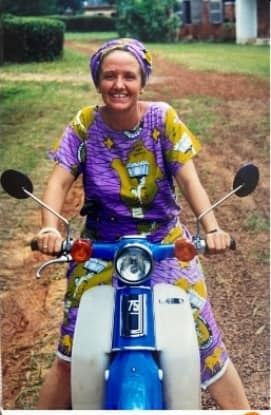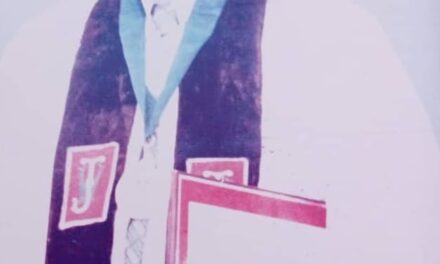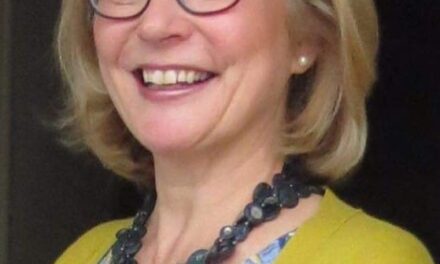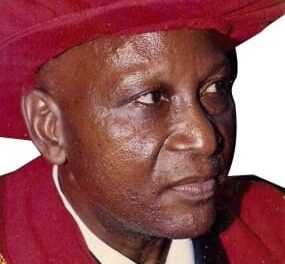The story of Mary Teresa Bojaxhiu, MC, better known as Mother Teresa or Saint Mother Teresa of Calcutta, an Albanian-Indian Catholic nun and the founder of the Missionaries of Charity, not only resonates with the story of Nkechi Rosalind Colwill. She worked with Mother Theresa for four months in her Home for Dying Destitute in Calcutta, India, using her savings in 1973. [1] She sold newspapers. She did chores to sponsor her voluntary work and people experiencing homelessness. As a teenage volunteer for humanitarian missions, Nkechi raised as a Catholic, has been to Zambia and Jamaica. Nkechi, ‘finalist of THE ONE 2014 Rotary District 3450, International Humanitarian Award, had dedicated her life to helping leprosy patients before she was admitted to the University of Wales in the UK.’ After graduation, Nkechi, a social worker by profession, worked in Bangladesh with home orphan girls in 1971. She worked with single homeless in England in 1980.
An invitation to an overseas mission came for Nkechi in 1981. She ‘got an opportunity to serve at a leprosy settlement in Nigeria as a missionary social worker at the Uzuakoli Leprosy Centre.’ It is on record that ‘when Rosalind joined the Uzuakoli Leprosy Centre, Sir H.U. Osoka, the Methodist Conference Lay President, was truly relieved and named her Nkechinyere (Nkechi for short – meaning a Gift of God) exclaiming that “God has provided the right person to come to Macedonia and help.” Sir Osoka later adopted Rosalind as a member of his family dynasty.’ Missionary social worker reminds us of the modern missionary division into three classes or faculties, medical, educational, and evangelistic. In his Selected Writings, The Ministry of the Spirit, Roland Allen wrote that ‘all missionaries sent out by Christian missionary societies are sent out as men who desire the conversion of those to whom they are sent and to the extent must be evangelists.’ [2] For Nkechi, knowing whether she is a missionary or her mission is not hard. One can easily say that Nkechi is not just a missionary social worker but a voluntary Christian missionary who has found the great secret of life in Jesus Christ and is eager to share it with others.
Nkechi later discovered that beyond leprosy care, there was a “new leprosy” ravaging the area, and she became ‘convinced that mental illness’ needed urgent attention. Amaudo Itumbauzo founded Umuahia in the Nigerian State of Abia in 1989. Nkechi, with the support of Methodist Church Nigeria, established the first centre in 1990 in a forest clearing donated by the local villages in Itumbauzo, Abia State. Presently, ‘Amaudo engaged with the government to provide mental health care in primary care settings across four states in southeast Nigeria under the Community Mental Health Program (CMHP).’ In the Christian worldview, Amaudo means “village of peace” in the local Igbo language. Amaudo was founded to heal using its environment, ‘but it was soon recognized that medical (psychiatric) treatment was also essential … loving environment, where people are treated with dignity and respect” and a place where they “carry out everything together—eating, sports, community work, and worship.” Amaudo provides a therapeutic environment, general medical and psychiatric treatment, and associated services.
Amaudo also helps inmates identify families and reunite them, teaching them how to care for their relatives. Discharged clients are also equipped with tools to build livelihoods in the community, maximizing social integration and reducing caregiver burden. Amaudo offers training in the center workshop (tailoring, hairdressing, farming, and woody.’ Archbishop Opoko explained that the establishment of Amaudo was not smooth. The leadership of the Church said to her, you have become crazy. Of course, they were right. It takes courage and a crazy commitment and dedication to establish a mentally ill Destitute Center, live, work, eat, and socialize with the new society outcasts.
On Health Education advocacy and campaign against the stigma associated with leprosy, Nkechi’ secured a 3-H Grant from Rotary District 9140 to procure a printing press which amongst others was used for printing leaflets.’ With the success of establishing Amaudo as a residential centre in 1992, Nkechi established ‘a second centre (Amaudo 2) in 1997 to ‘provide a community for patients who could not be discharged to their families.’ In 2002, a community-based rehabilitation program focusing on disabled children, Project Comfort, was established. The focus was on the ‘homeless people, mainly those with schizophrenia, who are admitted for general medical and mental health care in a process leading to skills development, discharge, and social reintegration.’ It was also in 2002 that she went into a coma for months and was confined to a wheelchair while she still pursued her mission in Nigeria.
Towards the end of January 2012, Nkechi traveled to the United Kingdom to undertake some studies. She said, “After attending three modules of my master’s program at Cliff College, it became obvious that Cliff had nothing to offer me on disability which was my chosen topic with spirituality – the nature of spirituality that comes out of disability. I felt the absence of a tutor/supervisor to assist me in doing the studies with the limitations I have, particularly dyspraxia, and after discussions with friends in the United Kingdom, I realized the only reason I was continuing was that I had never given up on anything before. I felt this was not a good reason to stay, so I withdrew from the college to spend more time working on my mobility, leaving a big tripod to start walking with a small stick.”
Nkechi, an uncommon voluntary missionary, not only speaks Igbo native language fluently, but she also enjoys Igbo special delicacies. Nkechi, a rural, rugged missionary, inspired me 30 years ago when l started working as Conference Editor at Methodist Church Nigeria, Wesley House, Marina, Lagos. Archbishop Ayo Ladigbolu, a retired Methodist Archbishop of Ilesa and on behalf of the Board of Bode Akindele Foundation, described ‘Chief Nkechi Rosa as a servant of God and minister of Comfort for the Insane Destitute. According to him, Nkechi offered her best to the Lord in our Nation’s service, and He has sustained you despite all to celebrate your 70th Natal Day. Our partnership with you boosted Southwest/Southeast cooperation and promoted Christ’s love and care.’ His Eminence Ola Makinde, a prelate emeritus, Methodist Church Nigeria, said, “GOD is great. Dame Chief Rosalind Ngosi is 70 years. What a Missionary of sacrifice, endurance faith, hard work, and doggedness and Amaudo and the Leper Colony will never forget her.” Archbishop Raphael Opoko described Nkechi as ‘an epitome of a Human being. A woman of courage. A woman with the Midas touch. A woman of grace. A daughter of destiny whom God used to shape the destinies of people that came across her. A beautiful soul with great mental alertness. A creative thinker and compassionate heart. She is a mentor who encourages and supports amazing talents, skills, competence, and effort.’ Happy renewing 70th birthday to Dame Rosalind Colwill, an embodiment of love and care. Selfless, sacrificial and compassionate. She had to live in a thatch raffia house with mud walls to identify with those she cared for, the lepers,
[1] https://theoneaward.wordpress.com/2017/02/17/rosalind-f-colwill-unrelentingly-fighting-against-leprosy-mental-illness-in-east-africa/
[2] Paton, David M., The Ministry of the Spirit: Selected Writings of Roland Allen (London: World Dominion Press, 1960), p. 66











I knew Rosalind when I was a teenager. She used to be dressed just like in the picture, and you will find her riding that little blue long distances over bad roads, or in Umuahia town, getting resource for the leper colony where she worked. I had always plan to return to Abia state to say thank you to her but, alas, I was also in the army…
Thank you to this wonderful but unsung lady.
Thanks to God. Worthy is the Lamb!